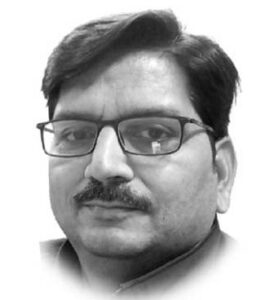
Life imitates art far more than art imitates life. – Oscar Wilde. This quote opens up a perennial debate in literary circles: art owes to the fountain of life for its subject matter or art introduces novelty and lends dreams to life.
Often we come across subjects in art touched with poignancy that we wonder whether such events would happen in real life. Actually, such subjects are envisioned by art working as a time machine, and they do happen in life.
In a Bollywood movie, Nil Battey Sannata, to bolster up the falling standard of her daughter’s studies and fulfil her own dream of making her daughter an IPS despite their miserable origin, Chanda, the protagonist, who is a single mother and domestic worker, gets herself enrolled in the same class and school where her 15-year-old daughter Apeksha is getting education. The title Nil Battey Sannata is a UP slang for good-for-nothing, someone beyond help, meant for Apeksha.
The realities of life itself hark me back to this real world as Keats sees off the mesmerising world induced by the lilting voice of the nightingale. This year’s higher secondary results presented a similar case of mother and daughter getting education in the same grade. Mrs Sumaira Parveen and her daughter Javaria, living in the subarban area Bhassar Purah of Kasur, appeared in the higher secondary exams, and both passed their level.
The mother had got married when she was in class eight. Her secondary school certificate shows her date of birth as 01 January 1991, and her nikah was solemnised on 06 April 2003, but the nikah certificate registers her as eighteen years old.
M Shakeel, the husband, himself was a dropout of grade nine. He tried his level best to refuse to get married at so tender an age and also for not being capable of running the family affairs both psychologically and financially.
The husband had to toil and moil all alone to support his family. With the birth of their first child, their financial miseries compounded, and to lend a helping hand, the wife started teaching at a private school. With her meagre income compared with the time and energy spent at the school, she couldn’t add anything substantial to the welfare and happiness of her family.
As it is said that it never rains but it pours, the husband’s health started deteriorating. He showed early symptoms of tuberculosis. Being the sole breadwinner, he can’t afford any rest or medication. Now, their miseries multiplied to unbearable proportions. The people who effectuated the forced marriage are seen nowhere around to help out the couple. Rather, what the couple are receiving unsolicited is the ridicule from family and society for making the wife resume her studies after marriage, and that too, along with her own daughter.
The family insisted that their story be written under their real names because their whole struggle is meant to burst this bubble of anonymity. They want to set a precedent for those who are coerced to lead a life regulated by others. Now, a mother of two, Sumaira is determined to push the glass ceiling and is striving to be a graduate. She nurses a dream that her daughter join the medical profession. Both mother and daughter are a source of help and strength for each other. They don’t want their dreams die before their own eyes, as in the movie, Chanda advises her daughter: “Those who don’t have a dream are really poor.”
Chanda and Dr Diwan (Chanda’s confidante) get involved in a dialogue that sums up that one of two things are needed for success: fate or diligence. The poor don’t have fate. Otherwise, they would not have been born poor. What they are left with is diligence with which they can architect their fate.
In the last scene, Chanda emphasises to her daughter the importance of dreams – the exclusive property of an individual: “Your dream is only yours. If you have your dream in your sight, no difficulty will last for too long…. Because if there’s anything we have to progress in life, it’s our dream. And no one can snatch it from us.”
—
The writer is an educationist based in Kasur. He can be reached at m.nadeemnadir777@gmail.com





